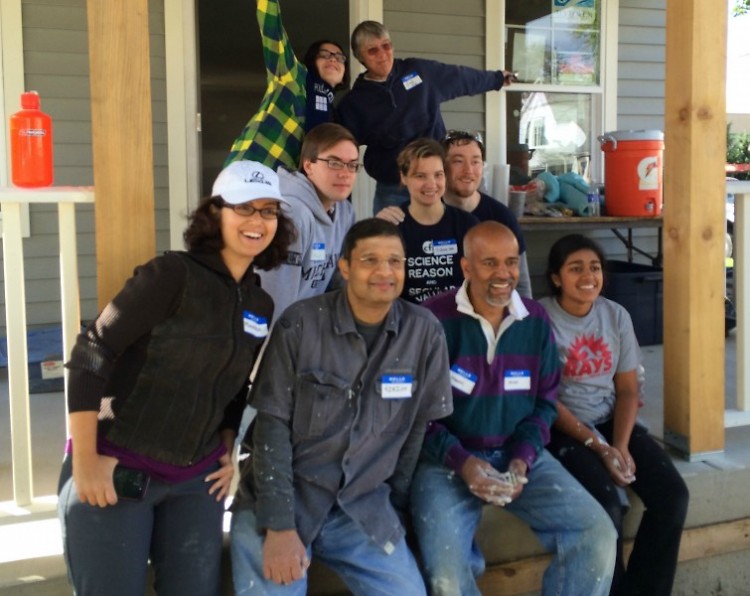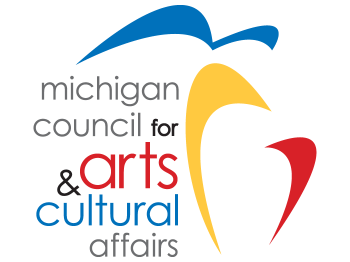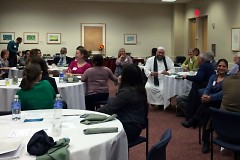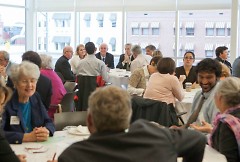This New Year, I am reminded by how far we have yet to go to accomplish understanding across difference and unity through diversity in our communities. As an interfaith advocate in a city which has a significant faith-rooted history, the potential for coming together around religion is strong, but sometimes it feels like the barriers to it are stronger.
Just one instance comes from last month, on December 12, 2015, when a Sikh man was shot in the cheek after being called “terrorist” and having “I used to kill people like you in Iraq” yelled at him during a robbery at a Grand Rapids corner store. Although the man that was shot was a Punjabi-American Sikh rather than an Iraqi Muslim like the shooter seems to have thought, this shows the consequences of the time of fear and hatred that we live in. Those who suffer from Islamophobic and xenophobic statements and actions are not just “those” people, but they are our neighbors, our community members and our friends.
Before we get into how to respond to such an incident, it is important to understand the context that led up to this attack. In the last few months of 2015, where we saw terrorist attacks permeate western borders and an increasingly dire refugee crisis, many felt the state of fear hit home. That fear, combined with a general ignorance of the religious context of these issues, ramped up the anti-Muslim, anti-refugee and general anti-“Other” rhetoric perpetuated in the media and by American politicians.
The dangerous rhetoric came from all over. After the Paris attacks, presidential nominees and state governors started to call for a halt to the entering of all Syrian refugees to the US. After the San Bernadino shooting, Jerry Falwell Jr., President of Liberty University, urged students to get concealed-carry permits, so “we could end those Muslims before they walked in and killed us.” Finally, Donald Trump called for a “total and complete shutdown of Muslims entering the United States,” including American Muslim citizens who would have happened to be abroad.
While these statements had little to no actual impact on policy, the consequences were real. These Islamophobic and xenophobic statements led to a dramatic increase in hate crimes and bias incidents. According to the Council on American Islamic Relations (CAIR), a Muslim advocacy group, incidents of discrimination and violence were at an all-time high in December 2015.
Back to right here in Grand Rapids. The violent consequences of Islamophobic rhetoric hit home for our community the day that a Sikh man was targeted for how he looked. Although he was a different religion that the man with the gun assumed, that shows the importance of us coming to learn about our neighbors even more. Islamophobia is not only an attack on Muslims, but on all religious minorities who might be perceived as “other.”
When the news of the shooting broke, I first saw a familiar face respond on the nightly news. Rishi Makkar, a local business owner and Sikh man who has helped me coordinate interfaith trips to the Grand Rapids Sikh Gurdwara (house of worship), said to Fox17 reporters that the incident should be considered a hate crime. Further, he clarified that Sikhism, as a religious tradition, does not believe fear, and teaches to not give in to oppression.
On the national level, many of my Muslim and Sikh friends from across the country stood in outrage against the attack on the man in Grand Rapids, as they often do when any attack on a religious minority occurs. This solidarity is even coming from leaders.
“No community in America should ever be the target of misguided hatred or backlash. Whether you’re a Muslim, Sikh, Jewish, Catholic, Mormon, whomever, we’re all Americans and we’re all a part of the fabric of this country,” said Harsimran Kaur, legal director at the Sikh Coalition, in an interview in response to the Islamophobic attacks occurring across the US.
I remember discussing these incidents of religious intolerance and violence with a heavy heart at our interfaith meetings at the end of the year. Sitting next to Grand Rapids community leaders from different religious and secular backgrounds, we listened to our brothers and sisters from minority religious traditions, and especially Muslims, express the fear they are now facing in this community they have called home for so long.
Hearing our colleagues and friends tell stories of living in fear for simply being who they are gave us a clear impetus to act. We, as a community of people of all different religious persuasions, were ready to stand up for our friends from different traditions in whatever way we were needed. At that meeting, many expressed that these values that bring us together– the values of tolerance, respect and appreciation for diversity– are stronger than the differences that terrorists often try to use to tear us apart.
This local act of solidarity coincided with a national call for unity through diversity. At the end of our last meeting of 2015, we tuned in to a live press feed from the White House on “Celebrating and Protecting America’s Tradition of Religious Pluralism.” The gathering urged increased interfaith efforts in all communities across the US, and there was one specific initiative that stood out: Know Your Neighbor.
Know Your Neighbor is an effort to break down the barriers of fear and ignorance that exist between us, and encourage us to have real, meaningful conversations between people of different religious and non-religious identities. It’s an initiative that is truly interfaith itself – with both religious and civic organizations partnering, including the ACLU, Center for Inquiry, Hindu American Seva Societies, Interfaith Youth Core, Muslim Advocates, National Council of Churches, Sikh Coalition and many more. They want us to build relationships with our neighbors that lead to understanding, respect and appreciation for the diversity our communities hold.
These conversations across difference may be challenging, but as we see after the attacks like the one on the Sikh man in December, if we do not embrace and appreciate our differences, they can create divisions between our communities. I have spent the past two and a half years in Grand Rapids building relationships with Calvinists and Catholics, Jews and Muslims, Hindus and Buddhists and Sikhs and secular folks, I have come to know our city through not just the neighbors that happen to believe the same things as me, but those who happen to follow different traditions than me.
It is through this type of community-building that I have come to appreciate Grand Rapids in its wholeness. It is this type of community-building that we must commit to in order to create a city that is not only inclusive of our differences, but celebrates our diversity.
The Rapidian, a program of the 501(c)3 nonprofit Community Media Center, relies on the community’s support to help cover the cost of training reporters and publishing content.
We need your help.
If each of our readers and content creators who values this community platform help support its creation and maintenance, The Rapidian can continue to educate and facilitate a conversation around issues for years to come.
Please support The Rapidian and make a contribution today.



